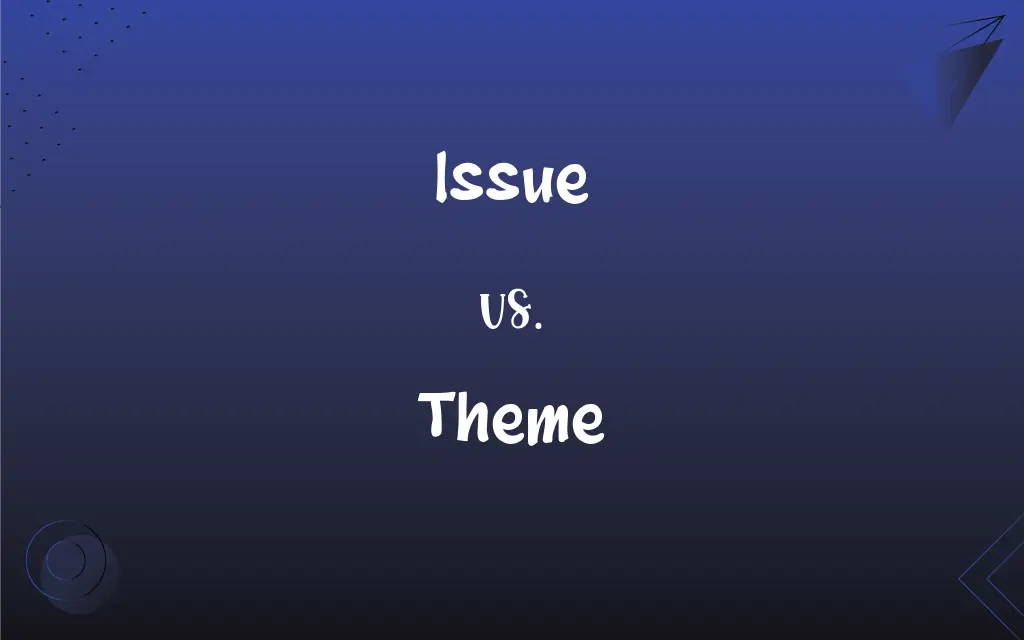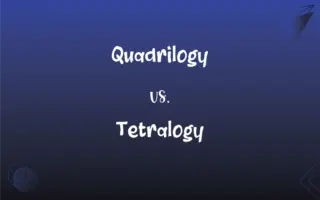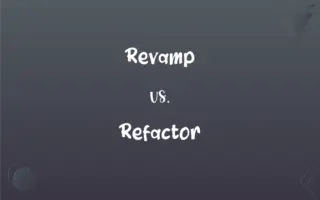Issue vs. Theme: What's the Difference?
Edited by Aimie Carlson || By Harlon Moss || Updated on November 6, 2023
Issue refers to a problem or matter for discussion; a theme is an underlying topic or recurring idea in a work of art.

Key Differences
An issue often denotes a problem, challenge, or point of debate within a particular context or society. A theme, conversely, suggests a central topic or idea that recurs throughout a literary or artistic work.
Issues are topics of discussion that can lead to conflict or require decision-making. Themes are more abstract, providing a foundational concept or message that informs the content and characters of a narrative.
While issues are practical and can be addressed or resolved through actions or discussions, themes are interpretative, often revealing deeper meanings or societal observations through their recurrence in a narrative or piece of art.
Issues usually provoke engagement or response, as in political issues that incite public opinion and action. Themes, in literature or art, invite contemplation and exploration of their relevance and manifestation in the work.
Issues can be specific and temporal, relating to current events or specific situations. Themes tend to be universal and timeless, resonating with broader human experiences across different cultures and eras.
ADVERTISEMENT
Comparison Chart
Definition
A problem or subject under discussion or debate.
An underlying message or recurring idea in a work.
Context
Can be social, political, economic, etc.
Literary, artistic, cultural contexts.
Nature
Often concrete and actionable.
Abstract and conceptual.
Purpose
To be resolved, discussed, or managed.
To provide depth, insight, or cohesion to content.
Timelessness
May be of a particular moment or era.
Generally universal and applicable to many contexts.
ADVERTISEMENT
Issue and Theme Definitions
Issue
A point in question or a matter that is in dispute.
The main issue in the lawsuit was the patent infringement.
Theme
A subject of discourse or artistic representation.
The art exhibition had a theme centered around sustainability.
Issue
A subject of debate or discussion.
The environmental impact is a major issue in the construction project.
Theme
The setting or subject of a talk or piece of writing.
The conference had a theme focusing on innovation in technology.
Issue
A problem or matter requiring a solution.
They addressed the issue of bullying at the school board meeting.
Theme
An overarching concept or motif in a piece of writing.
The novel’s theme of redemption resonates with many readers.
Issue
The act of distributing something.
The company faced delays in the issue of the new software update.
Theme
The central topic or idea explored in a text or artistic work.
Love and loss are the prevailing themes in her poetry.
Issue
A release or publication of something.
The latest issue of the magazine features health and wellness articles.
Theme
A recurring idea that is woven throughout a narrative.
The theme of good vs. evil runs through many classic fairy tales.
Issue
A point or matter of discussion, debate, or dispute
What legal and moral issues should we consider?.
Theme
A topic of discourse or discussion.
Issue
A matter of public concern
Debated economic issues.
Theme
A subject of artistic representation.
FAQs
Are all problems considered issues?
Generally, yes, though some problems are more significant and are specifically termed issues.
Does "theme" only apply to literature?
No, "theme" can apply to any work of art, including music and film.
Can "issue" refer to a magazine release?
Yes, "issue" can mean a specific edition of a publication.
Can issues be positive?
Typically, "issue" implies challenges, though some may have positive aspects.
Can a theme be a moral?
Yes, themes often convey morals or messages.
Is a theme always intentional in artwork?
Themes can be both intentional and subject to interpretation.
Is every discussion topic an issue?
Not always; some topics are informational and not problematic, thus not issues.
Are themes unique to each work?
Themes can be unique or common across multiple works.
Can "issue" be used as a verb?
Yes, for example, "The office will issue permits on Monday."
Can "issue" mean to come from a source?
Yes, as in "The order issued from the headquarters."
Do current events always relate to issues?
Yes, current events often involve issues of societal importance.
Can an event have a theme?
Yes, events often have themes to guide their style and content.
Can a theme be too broad?
Themes are often broad to allow for universal applicability.
Can "theme" refer to a recurring pattern in data?
Yes, "theme" can refer to patterns in academic or scientific analysis.
Does every narrative need a theme?
Not necessarily, but themes can add depth to a narrative.
Can a book have multiple themes?
Yes, many books explore several themes.
Do issues require action?
Yes, issues often necessitate some form of response or action.
Is it correct to say "issue a complaint"?
Yes, it means to formally express a complaint.
Is a theme tangible in a story?
No, themes are abstract concepts.
Is "issue" always negative?
Often, but not necessarily, as in "a special issue of a journal."
About Author
Written by
Harlon MossHarlon is a seasoned quality moderator and accomplished content writer for Difference Wiki. An alumnus of the prestigious University of California, he earned his degree in Computer Science. Leveraging his academic background, Harlon brings a meticulous and informed perspective to his work, ensuring content accuracy and excellence.
Edited by
Aimie CarlsonAimie Carlson, holding a master's degree in English literature, is a fervent English language enthusiast. She lends her writing talents to Difference Wiki, a prominent website that specializes in comparisons, offering readers insightful analyses that both captivate and inform.































































